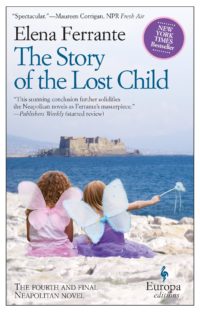I wish for this intrusion, I’ve hoped for it ever since I began
 The Story of the Lost Child
The Story of the Lost Child
Book 4, The Neapolitan Novels: Maturity, Old Age
by Elena Ferrante
translated from Italian by Ann Goldstein
Next week Tim and I are heading to Campania for our holiday, specifically to Pompeii and Ischia – the island that features prominently in the second volume of Elena Ferrante’s Neapolitan Novels, The Story of a New Name – so this seemed like a good time to read the final part of the series.
This book details the final few decades of the friendship of Elena and Lila, from their early 30s to the moment that opens the series: when 60-something-year-old Elena hears that her oldest friend has gone missing. The backdrop to their friendship is the changing society and politics of Naples, and in particular their own neighbourhood, a rough place filled with corruption.
“Only she can say if, in fact, she has managed to insert herself into this extremely long chain of words to modify my text, to purposely supply the missing links, to unhook others without letting it show, to say of me more than I want, more than I’m able to say. I wish for this intrusion, I’ve hoped for it ever since I began to write our story, but I have to get to the end in order to check all the pages. If I tried now, I would certainly get stuck.”
I can’t say much more without spoilers of the previous three books so here is your spoiler warning, people who haven’t read My Brilliant Friend, The Story of a New Name or Those Who Leave and Those Who Stay.
Book 3 ended with Elena finally getting her lifelong wish and starting a relationship with Nino. Both she and Nino are married with children, and Lila has only harsh words to say about the affair. Everything in Elena’s life is strained but when she is with Nino she is deliriously happy. She moves back to Naples and becomes close again with Lila. Her family and childhood friends all become part of her life again, in different ways.
Elena is now a successful author, but she still feels a need to prove herself to Lila – as a mother, as a friend and professionally. They fight bitterly and they provide a lifeline for each other. They experience joy and tragedy. Elena continues to occasionally mine her real life in her fiction, making this novel increasingly meta.
“I felt all the fascination of the way Lila governed the imagination of others or set it free, at will, with just a few words: that speaking, stopping, letting images and emotions go without adding anything else. I’m wrong, I said to myself in confusion, to write as I’ve done until now, recording everything I know. I should write the way she speaks, leave abysses, construct bridges and not finish them, force the reader to establish the flow.”
As with the previous instalments, the writing is excellent. Even though it’s a story of the minutiae of largely ordinary lives, every page is compelling. By this point I knew the characters well enough that I went through every emotional high and low point with Elena. But it’s not as compelling as My Brilliant Friend, which remains my favourite Ferrante book so far.
So the question now is which other Ferrante books should I check out? The Days of Abandonment? Troubling Love? All recommendations welcome!
Storia della bambina perduta published 2015 by Edizioni E/O.
This translation published 2015 by Europa Editions.
Source: Waterstones.